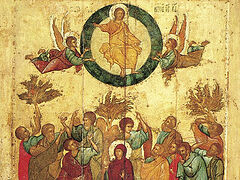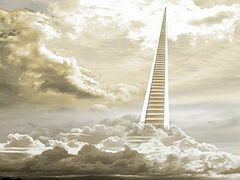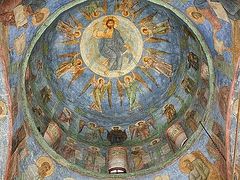 Man is a being with an upright spine. He cannot change the natural position of his body without losing his dignity. A man on all fours is not quite a man. He’s like the prodigal son, who tormented by hunger desired to feed from the pig trough. There is no other way to do it than by bending down to the ground and assuming the height of those contemptible animals.
Man is a being with an upright spine. He cannot change the natural position of his body without losing his dignity. A man on all fours is not quite a man. He’s like the prodigal son, who tormented by hunger desired to feed from the pig trough. There is no other way to do it than by bending down to the ground and assuming the height of those contemptible animals.
That is how sin presses us down to the ground. At first it buckles the knees under the pressure of temptation. Then it presses by shame, when the face is lowered and ashamed to look up to the heavens. At this point sin has not become a deed, not committed in fact, and still lives as a thought in the heart like a worm in an apple; yet the person has already lowered his eyes.
That is how it was with Cain, when the cruel pain of resentment wounded his pride. Cain was very wroth, and his countenance fell (Gen. 4:5). Knowing the heart of man, seeing what thoughts were ripening in his depths unseen by human eyes, God warns Cain against the sin that was being born in him. If thou doest well, shalt thou not be accepted? and if thou doest not well, sin lieth at the door. And unto thee shall be his desire, and thou shalt rule over him (Gen. 4:7).
What Cain did further on, we know. And the successes in earthly affairs that distinguished Cain’s descendants are in part the result of his eyes once being lowered to the earth. From this proceeded success in animal husbandry, metallurgy, and textiles, for which the Canaanites were known. Having once lowered his face to the earth, Cain became with time the father of a civilization successful in earthly affairs.
Such a natural movement of the head and eyes as gazing at the sky, is not given to everyone with equal ease. A man with a tormented conscience much more naturally bends to the earth and lowers his eyes. Heaven, that “throne of God” (Matt. 5:34) is recognized as pure and holy. That is why the prodigal son, in composing his prayer of repentance, prepares himself to say, Father, I have sinned against heaven, and before thee (Lk. 15:18).
And so, the Ascension straightens our bent backs. It makes us look up—and with joy at that.
Those who witnessed Christ’s sufferings also looked up. The hill itself was tall. Everyone who stands at the foot of a hill looks up to its peak. The cross was raised above the hill itself. Christ said, And I, if I be lifted up from the earth, will draw all men unto me (Jn. 12:32). He still draws human souls to Himself; and when we lift our faces to Golgotha, our eyes are filled with tears.
But not so in the Ascension. Then, seeing Him off with a prolonged gaze, the apostles returned to Jerusalem with great joy: And were continually in the temple, praising and blessing God (Lk. 24:52–53).
Christ lives! Christ emerged the victor from his battle with death! True, He’s not going to establish the Kingdom of Israel this year. And in general He does many things that people turned out to be unprepared for. Now for example He commands them not to part from Jerusalem but to wait for “power from on high”. He doesn’t say everything right away, and what He does say is not immediately understood. His thoughts are not our thoughts. But the main thing is that He lives, and promised to be with us to the end of the world! And if that is so, then there is nothing to fear.
Christ ascends, and people look up to heaven. This is a significant picture. For the apostles there is nothing great or interesting on earth in that hour. Everything that is most important for them is there, where Christ has ascended.
It’s very interesting that pagans gazed into the night sky, and the extraordinary light of a star in the sky brought them to the Infant Messiah. The first coming was announced by a dark sky adorned with stars. The same sky, only at broad daylight, will also announce the Second Coming. Angels in white garments said to the Apostles: Ye men of Galilee, why stand ye gazing up into heaven? this same Jesus, which is taken up from you into heaven, shall so come in like manner as ye have seen him go into heaven (Acts 1:11).
The feast of the Ascension becomes the feast of the announcement of the Second Coming. This is now the main goal of raising our eyes to heaven.
But let us not forget also the Cross of Golgotha. It also, as we recall, made people lift their faces to heaven. The Cross, the Ascension, the Second Coming. On the last day all these events will mingle into one, because before the glorious appearance of Christ to judge the world shall appear the sign of the Son of man in heaven: and then shall all the tribes of the earth mourn, and they shall see the Son of man coming in the clouds of heaven with power and great glory (Matt. 24:30). They will mourn because up till now they had always looked at the earth, did everything only for the sake of the earth, and measured their efforts by earthly success. To those who did not forget about heaven and about the One Who ascended there after His Resurrection, the Lord says, And when these things begin to come to pass, then look up, and lift up your heads; for your redemption draweth nigh (Lk. 21:28).
Sinners, let us bow down and straighten up. Let us all straighten our spines, we who are redeemed by the blood of the Son of God; all who have not forgotten about this great price of redemption; all who say to Christ, Even so, come Lord Jesus (Rev. 22:20).
We no longer need to crawl in the dust on all fours. Our dignity has been restored to us, and sonship has been given to us. The ascended Lord imparts a vertical coordinate to the thoughts of a believing human heart. And the son returning home once again hears the voice of his Father, saying, Bring forth the best robe, and put it on him; and put a ring on his hand, and shoes on his feet (Lk. 15:22).



